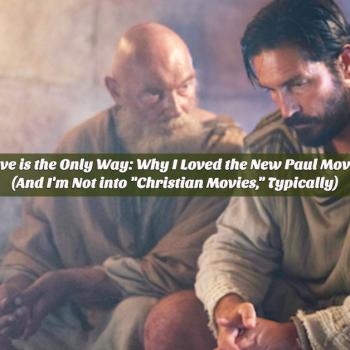Recently the internet has been abuzz with an interesting story (Here’s where I read about it: Watch a home-schooler mom go through a science museum and destroy evolution) [this isn’t an endoresemnt of the full content of that article, just an example of how this video has gone viral, etc.].
A homeschool mom [unfortunately, the reputation of Christian homeschool curriculum is that it is anti-scientific as it tends to be written from a fundamentalist perspective…this ISN’T to say that ALL homeschool families take this approach], who is a literal 6 day young earth creationist, went to a museum to demolish evolutionary arguments. She sees a stark dichotomy between biological evolution and Creation. Her story isn’t unique as this approach is normative in certain segments of evangelical culture. She illustrates a broader issue.
If you have read my blog over the years, since 2008 I’ve preached that this is a FALSE DICHOTOMY!!!! It causes people to lose their faith and it is not warranted by a close reading of the Scriptures within their historical context (all of this is demonstrated in my ebook discussed below). I can’t help but empathize with her zeal while continue in my growing weariness of this anti-scientific attitude of some Christians.
For this reason, I wrote an Ebook as a resource for Christians who question the idea that evolutionary science and God as creator are in conflict. The jury is out–these can easily and faithfully be held together. C.S. Lewis, N.T. Wright, Tim Keller, Greg Boyd, John Walton, Bruce Waltke, Philip Yancey, Scot McKight, John Stott, Francis Collins, Darrel Falk, Os Guinness, Peter Enns, Joel Hunter, Tremper Longman III, Alister McGrath, and Mark Noll – are examples of respected evangelical scholars or pastors who have openly affirmed evolution and hold a high view of biblical authority.
Feel free to watch part of the video to get a feel for why people have been reacting to Megan Fox (the homeschool mom, not April O’Neal). I’m sure that Mrs. Fox is a nice person with passionate intentions, but she unfortunately is stuck in a paradigm that doesn’t work: biblically or scientifically. Then, consider all of the following quotes as evidence that this anti-evolution posture is completely irrelevant–both to culture and to the church of Jesus Christ.
In trying to defend the Christian faith against evolutionary biology, so many people actually make it look anti-intellectual–including many pastors. This creates a stumbling block for many people, especially millennials, who are walking out of the church and away from Christ directly due to issues like this one. This reality alone should cause 6 day conservative Christians to reconsider their view.
For a helpful intro to the pastoral and theological issues, download my free Ebook: Evolving Evangelicalism. In it, I deal with Genesis 1 and several options for dealing with Adam and Eve.
Mark Noll
Evangelicals make much of their ability to read the Bible in a “simple,” “literal,” or “natural” fashion…In actual fact, evangelical hermeneutics, as illustrated in creationism, is dictated by very specific assumptions that dominated Western intellectual life from roughly 1650 to 1850 (and in North America for a few decades more).Before and after that time, many Christians and other thinkers have recognized that no observations are “simple” and no texts yield to uncritically “literal” readings….[T]o interpret the early chapters of Genesis adequately, it is necessary to make use of the thorough historical study of the ancient world, carefully nuanced exegesis, and wide familiarity with scientific procedures and results.[1]
Billy Graham
I don’t think that there’s any conflict at all between science today and the Scriptures. I think we have misinterpreted the Scriptures many times and we’ve tried to make the Scriptures say things that they weren’t meant to say, and I think we have made a mistake by thinking the Bible is a scientific book. The Bible is not a book of science. The Bible is a book of Redemption, and of course, I accept the Creation story. I believe that God created man, and whether it came by an evolutionary process and at a certain point He took this person or being and made him a living soul or not, does not change the fact that God did create man… whichever way God did it makes no difference as to what man is and man’s relationship to God.[2]
Timothy Keller
“Belief in evolution as a biological process is not the same as belief in evolution as a worldview.”[3]
Also: “One of my favorite Christian writers (that’s putting it mildly), C.S. Lewis, did not believe in a literal Adam and Eve, and I do not question the reality or soundness of his personal faith.”[4]
CS Lewis
“For long centuries, God perfected the animal form which was to become the vehicle of humanity and the image of Himself. he gave it hands whose thumb could be applied to each of the fingers, and jaws and teeth and throat capable of articulation, and a brain sufficiently complex to execute all of the material motions whereby rational thought is incarnated. The creature may have existed in this state for ages before it became man: it may even have been clever enough to make things which a modern archaeologist would accept as proof of its humanity. But it was only an animal because all its physical and psychical processes were directed to purely material and natural ends. Then, in the fullness of time, God caused to descend upon this organism, both on its psychology and physiology, a new kind of consciousness which could say “I” and “me,” which could look upon itself as an object, which knew God, which could make judgments of truth, beauty and goodness, and which was so far above time that it could perceive time flowing past…. We do not know how many of these creatures God made, nor how long they continued in the Paradisal state. But sooner or later they fell. Someone or something whispered that they could become as gods…. They wanted some corner in this universe of which they could say to God, “This is our business, not yours.” But there is no such corner. They wanted to be nouns, but they were, and eternally must be, mere adjectives. We have no idea in what particular act, or series of acts, the self-contradictory, impossible wish found expression. For all I can see, it might have concerned the literal eating of a fruit, the the question is of no consequence.”[5]
Augustine
He gives us an important waring: “Reckless and incompetent expounders of Holy Scripture bring untold trouble and sorrow on their wiser brethren when they are caught in one of their mischievous false opinions and are taken to task by those who are not bound by the authority of our sacred books.”[6]
John Stott
“Not many Christians today find it necessary to defend the concept of a literal six-day creation, for the text does not demand it, and scientific discovery appears to contradict it. The biblical text presents itself not as a scientific treatise but as a highly stylized literary statement (deliberately framed in three pairs, the fourth “day” corresponding to the first, the fifth to the second, and the sixth to the third)…
“It is most unfortunate that some who debate this issue (evolution) begin by assuming that the words “creation” and “evolution” are mutually exclusive. If everything has come into existence through evolution, they say, then biblical creation has been disproved, whereas if God has created all things, then evolution must be false. It is, rather, this naïve alternative which is false. It presupposes a very narrow definition of the two terms, both of which in fact have a wide range of meanings, and both of which are being freshly discussed today…
“But my acceptance of Adam and Eve as historical is not incompatible with my belief that several forms of pre-Adamic ‘hominid’ may have existed for thousands of years previously. These hominids began to advance culturally. They made their cave drawings and buried their dead. It is conceivable that God created Adam out of one of them. You may call them homo erectus. I think you may even call some of them homo sapiens, for these are arbitrary scientific names. But Adam was the first homo divinus, if I may coin a phrase, the first man to whom may be given the Biblical designation ‘made in the image of God’. Precisely what the divine likeness was, which was stamped upon him, we do not know, for Scripture nowhere tells us. But Scripture seems to suggest that it includes rational, moral, social, and spiritual faculties which make man unlike all other creatures and like God the creator, and on account of which he was given ‘dominion’ over the lower creation.”[7]
N.T. Wright
“…perhaps what Genesis is telling us is that God chose one pair from the rest of early hominids for a special, strange, demanding, vocation. This pair (call them Adam and Eve if you like) were to be the representatives of the whole human race, the ones in whom God’s purpose to make the whole world a place of delight and joy and order, eventually colonizing the whole creation, was to be taken forward. God the creator put in their hands the fragile task of being his image bearers. If they fail, they will bring the whole purpose for the wider creation, including all the nonchosen hominids, down with them.”[8]
Peter Enns
Jews and gentiles share the same plight, and Jesus came to solve it.And all of this stems from Paul’s rereading of his Scripture in light of the central and prior conviction that God raised Jesus from the dead…Explaining Paul’s Adam this way… shows… a high view of Christ – so high that even Israel’s story, specifically Adam, must be recast to account for Christ.Paul invests Adam with capital he does not have either in the Genesis story, the Old Testament as a whole, or the interpretations of his contemporary Jews.His reading of the Old Testament in general is creative, driven by hermeneutical conventions of the time and – most importantly – by his experience of the risen Christ.Hence, Christians who take Paul’s theology with utmost seriousness are not also bound to accept Paul’s view of Adam historically.[9]
John Goldingay
I am told there are readers of Genesis who argue like this.If evolution is true, there was no Adam and Eve.If there was no Adam and Eve, there was no fall.If there was no fall, we didn’t need Jesus to save us.But this argument is back to front.In reality, we know we needed Jesus to save us.We recognize the way Genesis describes our predicament as human beings.We know we have not realized our vocation to take the world to its destiny and serve the earth…We know there is something wrong with our relationship with God.We know we die…The question Genesis handles is, was all that a series of problems built into humanity when it came into existence?And its answer is that this is not so…There was a point when humanity had to choose whether it wanted to go God’s way, and it chose not to.The Adam and Eve story gives us a parabolic account of that…God brought the first human beings into existence with their vocation and they turned away from it.[10]
DOWNLOAD THE FREE EBOOK HERE:
Evolving Evangelicalism: Inviting Church Leaders to Refine their Approach to Scriptures and Origins
[1]. Mark A. Noll, The Scandal of the Evangelical Mind (Grand Rapids, Mich.: W.B. Eerdmans, 1994), 197.
[2]. David Frost, “Doubts and Certainties: David Frost Interview (BBC-2, 1964),” in Billy Graham: Personal Thoughts of a Public Man – 30 Years of Conversations with David Frost (Colorado Springs: Chariot Victor, 1997), 73-74.
[3]. Timothy Keller, “Creation, Evolution, and Christian Laypeople,” BioLogos Foundation, http://biologos.org/resources/timothy-keller/ (accessed February 11, 2012), 5.
[4]. Keller, Creation, Evolution, and Christian Laypeople, 7.
[5] C.S. Lewis, Problem of Pain, 68-71
[6]. As quoted by: I. Howard J. Van Till, “God and Evolution: An Exchange,” First Things: A Monthly Journal of Religion & Public Life, no. 34 (June 1993). Humanities International Index, EBSCOhost (accessed January 4, 2011), 32-38.
[7] John Stott, Understanding the Bible: Expanded Edition; 54-56
[8] NT Wright, Surprised By Scripture, 37-38.
[9]Enns, The Evolution of Adam: What the Bible Does and Doesn’t Say about Human Origins, 135.
[10]. Goldingay, Genesis for Everyone: Part 1, 62-63.













